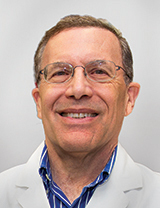
|
Andrew Arnold, MDMurray-Heilig Chair in Molecular MedicineProfessor of Medicine and Genetics and Genome Sciences Chief, Division of Endocrinology and Metabolism Director, Center for Molecular Oncology and Chief Academic Officer, Carole and Ray Neag Comprehensive Cancer Center Director, Office of Physician-Scientist Career Development
|
|||||||||||
| No data available |
Post-Graduate Training
| Training | Institution | Specialty |
|---|---|---|
| Residency | University of Chicago | Internal Medicine |
| Fellowship | Massachusetts General Hospital | Medicine, Endocrinology |
| Fellowship | National Cancer Institute/NIH | Molecular Oncology |
Awards
| Name of Award/Honor | Awarding Organization |
|---|---|
| Refer to Abbreviated CV Link |
Parathyroid disorders; genetic/inherited endocrine tumor syndromes
The most longstanding interest of our laboratory has been in the molecular genetic underpinnings of tumors of the endocrine glands. It was in the context of a search for a parathyroid tumor oncogene lying adjacent to a clonal chromosomal breakpoint that we discovered cyclin D1 (PRAD1). Cyclin D1 has proven to play a key role in cell cycle regulation, and has emerged as a major human oncogene, important in multiple types of tumors including breast cancer and B-cell lymphoma. We are currently pursuing a number of approaches, including the use of transgenic mouse models, to learn more about the precise mechanisms by which cyclin D1 exerts its oncogenic effects. In addition to the cyclin D1 work, we are continuing a major initiative seeking additional genes that contribute to endocrine neoplasia. As an example, we identified the HRPT2 (CDC73) gene as a major factor in the development of malignant parathyroid tumors, a finding that carries important clinical implications.
please contact PI to discuss
Not accepting lab rotation students at this time for Fall 2025/Spring 2026
Journal Articles
-
FLCN Variants in Parathyroid Carcinoma and Atypical Parathyroid Tumors.
Journal of the Endocrine Society 2025 Jan;9(2):bvaf009
-
Phenotype of Parathyroid-targeted Cdc73 Deletion in Mice Is Strain-dependent.
Journal of the Endocrine Society 2024 Jan;8(3):bvae006
-
Estimating time to conduct a meta-analysis from number of citations retrieved.
JAMA 1999 Aug;282(7):634-5
Book Chapters
-
Gene test interpretation: MEN1 (multiple endocrine neoplasia).
Post TW, ed. UpToDate. Waltham, MA: UpToDate, Inc., 2024.
-
Multiple endocrine neoplasia type 1: clinical manifestations and diagnosis.
Post TW, ed. UpToDate. Waltham, MA: UpToDate, Inc., 2024.
-
Multiple endocrine neoplasia type 1: genetics.
Post TW, ed. UpToDate. Waltham, MA: UpToDate, Inc., 2024.
-
Multiple endocrine neoplasia type 1: management.
Post TW, ed. UpToDate. Waltham, MA: UpToDate, Inc., 2024.
-
Parathyroid carcinoma.
Post TW, ed. UpToDate. Waltham, MA: UpToDate, Inc., 2023.
-
Parathyroid carcinoma.
Post TW, ed. UpToDate. Waltham, MA: UpToDate, Inc., 2024.
-
Primary hyperparathyroidism: pathogenesis and etiology.
Post TW, ed. UpToDate. Waltham, MA: UpToDate, Inc., 2024.
